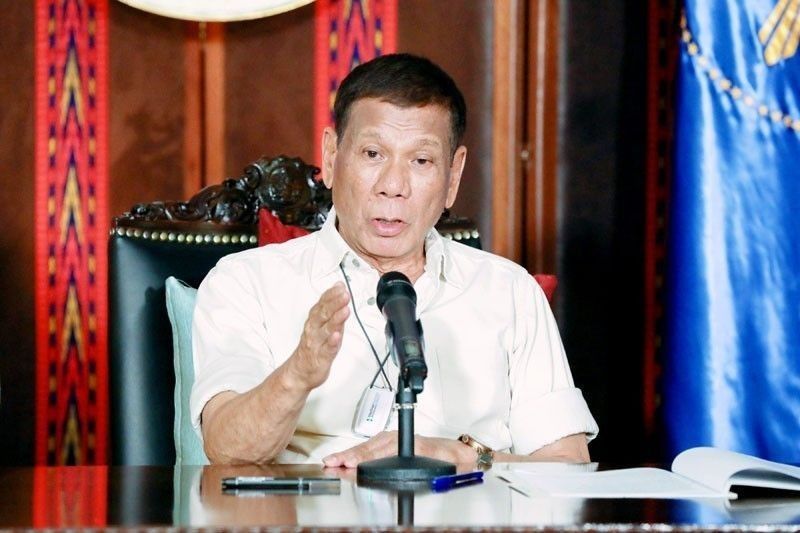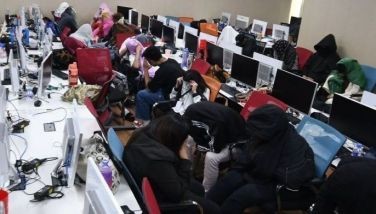Populist leaders like Duterte poll well during crises — political scientist

MANILA, Philippines — Populist leaders thrive in times of crisis, a political scientist said on Monday in response to the high approval and trust ratings credited to President Rodrigo Duterte by a recent poll.
A Pulse Asia survey published on Monday placed both Duterte's trust and approval ratings at 91%, showing a marked increase from the already high numbers he garnered from a December 2019 poll conducted by the same research company.
"I think populist leaders like Duterte are really masters of exploiting anxieties and crisis without really necessarily solving them," political scientist Cleve Arguelles told ANC.
"The results may be a bit counterintuitive for those who think the pandemic was mismanaged, and I think it was mismanaged. But populist leaders like Duterte are really known to thrive in times of crisis so during times of emergency, such as the COVID-19 pandemic that we're currently experiencing, we know that people look to strongmen, capable leaders to bring order," Arguelles said.
A global trend
Arguelles, who is a PhD candidate at the Australian National University-Coral Bell School researching democracy and Southeast Asia politics, further explained that there is a trend of populist leaders who are experiencing heightened approval from the public despite seeming missteps in their response to the pandemic.
He cited Brazilian President Jair Bolsonaro and Indian Prime Minister Narendra Modi, drawing similarities to what he called their poor performance in terms of handling the pandemic to the Philippines' own struggle with the virus under the Duterte administration.
"Brazil, for example, second highest number of COVID cases in the world. Similarly, like Duterte, Bolsonaro and Modi's approval ratings are also the highest ever since they came to power. So I think we're seeing the same trend here," he said.
India, Brazil among nations hardest hit by COVID-19
The Philippines last week became the 20th country with the most cases of COVID-19 in the world, logging the most infections in the entire Southeast Asia.
Globally, India is second only to the US in caseload, with over 6.6 million cases according to the Johns Hopkins University's COVID-19 tracker. Brazil trails india with over 4.9 million infections.
However, Brazil's deaths due to the virus surpass India's at over 146,352, trailing only the US which has a death toll of about 210,155. India comes in third for most deaths with 102,685.
In May, months into the pandemic-induced global crisis, the New York Times reported that Modi's already high approval ratings rose further, ranging from 80% to 90%.
Similarly, in Brazil, while Bolsonaro's favorability initially took a hit when he contracted COVID-19 and after his health ministry stopped reporting data on infections, The Atlantic reports that polls now show that his approval ratings rose from 32% in June to nearly 40%.
How is Duterte 'exploiting' the COVID-19 crisis?
"We can say that crisis like this make the activation of populist attitudes more likely and I think these numbers show that," Arguelles said Monday. But how exactly does this play out?
The political scientist explained that populists such as Duterte often rise to power due to factors such as economic insecurity and growing inequality. Arguelles said that in times of crisis, these anxieties are further exacerbated and brought to center stage by populists to make the public more receptive to a "strongman" kind of leadership.
"We've got the highest level of unemployment, many people are hungry, you've got people who cannot go to work because of transportation issues," he pointed out.
While it might be intuitive to think that the popularity of leaders in power suffer under such circumstances, Arguelles explained that "populist leaders are good at exploiting these kinds of anxieties because [of] how they sell a particular narrative."
The narrative being that "during times of anxiety and disorder and crisis, there's only one person who is able to bring back order, and that's a strongman [or] populist leadership."
Leaders like Duterte, Arguelles explained, even take steps to add unnecessary crisis to existing ones. He said this is because populist leaders are positioned to "benefit from creating social and economic anxieties in their societies."
To elaborate on this, he cited the shutdown of ABS-CBN, the country's largest media network, which resulted in the loss of jobs of over 11,000 workers. The shutdown was also condemned by the Alliance of Health Workers who flagged the loss of a major source of information amid the pandemic.
Another result of the shuttering of ABS-CBN is the rendering of the current media landscape to be more favorable to the interests of Duterte's administration, the political scientist said.
"The media environment is conducive for populist propaganda: limited reach of ABS-CBN, disinformation in social media, gaslighting strategy of his communications team," Arguelles said on Twitter following his interview.
RELATED: Facebook takes down Chinese, Philippine networks due to 'coordinated inauthentic behavior' | Gov't should disclose state-backed ‘advocacy groups’ after Facebook takedown — rights group
"It's also important to pay attention to how issue framing works. Duterte spent time doing weekly address. He was shaping the narrative of who is responsible [or] accountable for the pandemic to his advantage," he added.
"He would repeatedly claim that we are defenseless against a virus, that no [government] was prepared for this, and that we can’t really do anything about it but wait for the vaccine. Perhaps that strategy paid off."
Consolidating power amid the pandemic
In August, members of the academe warned that populist 'strongmen' have used the COVID-19 crisis to further consolidate their power. They said this during a virtual town hall hosted by think tank Stratbase Albert del Rosario Institute.
"[The] COVID pandemic crisis has provided an opportunity for populists and strongmen all over the world to consolidate power and use that power not really to address the public health crisis but to advance their own interest," Dr. Julio Teehankee, Political Science and International Studies professor at De La Salle University, said.
In addition to the shuttering of ABS-CBN, participants also flagged the passage of the Anti-Terrorism Law and the possible postponement of elections as worrisome developments unfolding amid the crisis.
- Latest
- Trending































